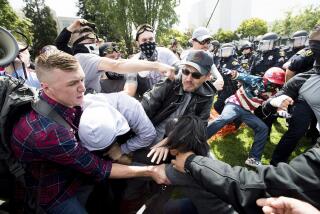Ruling Voided on Immigrants’ Speech Rights : Courts: Appellate judges say decision guaranteeing First Amendment protection was premature.
- Share via
A federal appellate court on Friday rejected a Los Angeles judge’s ruling that immigrants have the same broad free speech rights as American citizens, saying that it was premature.
In a 3-0 decision, the U.S. 9th Circuit Court of Appeals set aside a 1988 finding by U.S. District Judge Stephen V. Wilson, hailed by civil rights lawyers, that the federal government could not deport eight immigrants merely because of unpopular political views.
The emotionally charged case centered on the government’s bid to deport seven Palestinians and a Kenyan for subversion. The defendants, who refer to themselves as the “L.A. Eight,” were arrested and briefly jailed in 1987 by FBI and immigration agents, who sought to bar them from the country, citing their alleged membership in the Popular Front for the Liberation of Palestine, a group with a history of terrorism.
All eight denied membership, and none of them was charged with criminal wrongdoing.
Because of legal maneuvering in U.S. Immigration Court and the federal court system, the government has yet to make public its evidence against the eight immigrants, all of whom lived in the Los Angeles area at the time of their arrests. The Immigration Court trial of the two lead defendants--Khader Musa Hamide, 36, of Los Angeles and Michel Ibrahim Shehadeh, 35, of Long Beach--has not yet been scheduled.
As a result, the appellate court concluded Friday that the First Amendment challenges of the defendants “are not ripe for review.”
In the unanimous decision, Judge Cecil F. Poole wrote:
“This case has come to us upon a sketchy record and with many unknown facts. . . . We do not know, for example, whether the (immigrants) are actually members of the PFLP or what specific acts the government alleges (they) have committed in violation of the challenged provisions.”
In his lower court decision, Wilson underscored the free speech rights of all individuals living in this country, regardless of whether they are citizens.
“In this case, the government is trying to stifle certain ideas from entering our society from certain aliens through its immigration power,” Wilson said. “Our society, however, was built on the premise that only through the free flow of ideas can our nation grow and prosper.”
Steven R. Valentine, an attorney in the Justice Department’s civil rights division in Washington, which is seeking the deportations, said noncitizens “have adequate legal protection now.”
Valentine, in a recent interview, said the long legal battle involved “tough issues. We’re trying to balance the rights of aliens with the national security rights of the government.”
Carol Sobel, an American Civil Liberties Union lawyer who represents the eight, said she was disappointed with Friday’s action, but noted that the appellate judges had not ruled on the merits of Wilson’s decision.
“We think we ultimately will prevail,” she said.
The ACLU and other civil rights lawyers will have to study the appellate decision before deciding whether to appeal it to the U.S. Supreme Court, she said.
In March, two of the defendants--Naim Nadim Sharif, 32, of Northridge and Aiad Khaled Barakat, 31, of Virginia--were informed by the Immigration and Naturalization Service that they could not become permanent U.S. residents because of their alleged links to the PFLP. Again, the government refused to disclose the evidence used to reach the decision, which the ACLU appealed to federal court in Los Angeles.
The following month, the INS, for the fourth time, altered subversion charges against Hamide and Shehadeh. The newest charges, based on a section of the Immigration Act of 1990, accuse them of committing acts which “afforded material support to the PFLP . . . a terrorist organization.”
More to Read
Sign up for Essential California
The most important California stories and recommendations in your inbox every morning.
You may occasionally receive promotional content from the Los Angeles Times.










